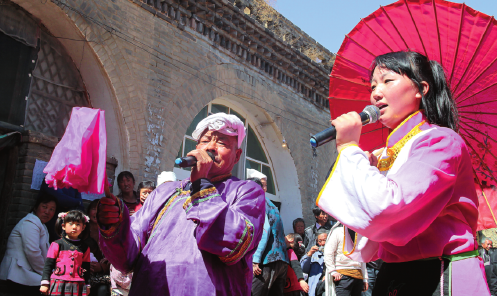
Gao Xiye (left) sings traditional ceremonial folk songs, which is one of the four intricate and disappearing intangible items studied by a Tsinghua University documentary group.[China Daily]
Four Chinese folk art practitioners are said to hold the key to happiness, according to a Tsinghua University's discovery. Sun Ye learns more.
There are four Chinese you should know. None of them is famous—or has the prospect of becoming so—or wealthy, or highly educated, or a newsmaker. But the four craftspeople from the countryside have somehow unknowingly found the secret to happiness, serenity and the essence of being a traditional Chinese.
That is, they're all virtuous, unconditionally kind and unruffled by the changing times—a feat most urbanites struggle with, according to the Tsinghua University documentary group that studied them closely.
The four are Lyu Chongde, a shadow play singer and instructor; Cheng Xiaochun, who makes zhi lian, the instrument pivotal to Chinese rice-paper; Gao Xiye, who sings traditional ceremonial folk songs; and Chi Suying, who practices the drum fan dance where the fan doubles as the ornament and skin of the drum.
They are among the carriers of intangible heritage items (though none were officially named), whose arts are intricate, hard-to-learn and used to be found everywhere in the country.
According to the documentary group, it's the skills they possess that hold the key to a good, contented life. The recent findings were recently published in Four Chinese, a Study of the Social Functions of Intangible Heritage Items.
Jiao Ruiqing, Liang Junjian, Lei Jianjun and their studio have been following dying folk arts around the country since 2007.
"We're just trying to record the arts as they are when the project started," Liang, now a lecturer at the university, says. "But then we found the arts, interesting in themselves, have a profound impact on the inner worlds of the practitioners."
"Arts set them apart from everyone else," says Jiao, a graduate of the university who also makes documentary films.\
Cheng Xiaochun makes rice paper tools the traditional way in Zhejiang province. He also has had a smelly day job in a urea factory for some 30 years.
Cheng is devoted to his family business that traces back to the Qing Dynasty (1644-1911). He will trek long distances every year for the lacquer essential to zhi lian, the mold for the paper. He will paint, drill holes and work on hair-thin bamboo splits days on end. Proper rice-paper done in his way is smooth like "a woman's skin". (The quaint paper-making process can be seen in the documentary film A Piece of Traditional Rice Paper.)
Seeing such a piece of paper gives him satisfaction, though not much money.
